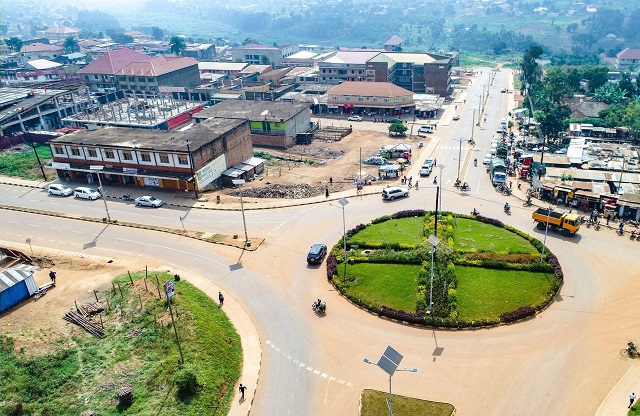
Kampala, Uganda | THE INDEPENDENT | The elevation of Masaka municipality to city status is covered in uncertainty over the failure by leaders to agree on its boundaries.
The Municipality was supposed to be elevated to city status in 2023, but following pressure from among others; the Kabaka of Buganda Ronald Muwenda Mutebi II and religious leaders, the Minister for Local Government, Tom Butime rescinded the earlier position, and accepted to include Masaka in the first batch of proposed cities whose operationalization is due for the 2020/21 financial year.
The other municipalities are Arua, Mbarara, Gulu, Jinja and Fort Portal.
Key among the requirements for a city according to paragraph 32 (1)a of the third Schedule of the Local Government Act include; having a population of at least five hundred thousand inhabitants, capacity of the urban area to meet its cost of delivery of services, having a master plan among others.
However, the National Urbanization Policy which was adopted by cabinet according to Butime reduced the population threshold to 300,000 people but set a requirement of a radius ranging between 50 to 100 square kilometres of land size for the proposed new cities.
To meet these requirements, Masaka municipality is supposed to expand its boundaries into the other peri-urban areas in the neighbourhood. However, this caused disagreements among leaders.
According to records at the Uganda Bureau of Statistic indicates Masaka Municipality’s population by 2018 was at about 120,000 people and an area size of 46.3 square kilometres; leaving a deficit of over 170,000 and 54 square kilometres of people and land area respectively.
At the centre of the growing controversy is the municipality Mayor Godfrey Kayemba, who prefers to extend into the urban areas that fall under Lwengo and Kalungu districts, a proposal that Masaka LCV Chairperson Jude Mbabali is against.
Mbabali wants all sub-counties in Masaka merged to form Masaka City.
The disagreements between the two leaders are threatening aspiration of attaining the much-awaited city status.
Kayemba, despite being a member of the Forum for Democratic Change-FDC party, he has of late courted support from National Resistance Movement-NRM leaders.
“Masaka is a traditional district whose historical legacy ought to be preserved. We can have and city and as well remain with the district. We shall have more leadership positions, translating into more opportunities both from government and otherwise,” Kayemba says.
The Kayemba team is now relying on section 2 (a) of the Local Government Act as amended in 2010, which gives powers to the line minister to declare “an urban area” into a city.
Kayemba’s interpretation is that this case, the urban area meant is; Masaka Municipality not the district which he says is largely rural.
“The application for elevation to a city was originally made by the Municipal council, and we are eagerly expecting the minister to only honour the same,” he says. It is trespassing for the district leadership to dictate positions over an autonomous body of a municipality, especially when it is against our wish, he adds.
Masaka Municipality Member of Parliament Mathias Mpuuga says that leaders in the area have met several times and agreed on a common position. He wonders why the Mayor and other leaders are selfishly conspiring against the idea embraced by the majority.
“Upon holding numerous meetings amongst ourselves, we went as a team and presented our drafts to the line ministry before we proceeded to the ministry of finance where we accordingly secured a certificate of financial implication,” he added.
Mpuuga explains that the idea was adopted after they realized that Masaka district could no longer sustain itself in terms of local revenue collections after losing two of its sub-counties into the proposed city.
“The idea by our adversaries in real sense lives Masaka district with only three sub-counties, that can hardly raise revenues that can afford even a mere bicycle for the chairperson. It is just logical that all these areas are merged alongside those we obtained from the neighbouring districts to form a broader city that benefits all of us,” he argued.
According to Mpuuga, Masaka’s pursuit to attain a city status isn’t a mere ritual, but an ambition to have a more viable city which merits growth.
“We are a unique area, holding onto the fact that governments destroyed our town during two subsequent wars. Unlike other areas, Masaka has literally been built by private people, it therefore become imperative of government to work out modalities making it a unique city,” he argues.
Vincent Kibuuka Musoke, the Masaka retired High Court judge has asked the leaders to have a common position on the matter, which he says will be a basis upon which government will respond to their demands.
“It is important that we harmonize positions on the subject, such that we don’t send mixed signals to government. There are precedents in others countries, some known big cities have got agricultural estates, bigger forests within, it just a matter of drawing and enforcing a land-use laws in the demarcated city,” he says.
John Baptist Kawanga, a prominent lawyer and former Masaka Municipality MP, advises the architects of the idea of a broader city to remain resolute in their position which he says is the most appropriate.
“We should stick to what is proper for the area in our wisdom, but not be cowed by the deadline that may push us in the wrong direction,” he says.
Justinian Nuwagaba, the Commissioner for Urban Development at the Ministry of Local Government indicates that the both factions have submitted their proposals, which is unfortunate to the common pursuit.
He says, their technical team will review both proposals and make report to the minister for eventual submission to Parliament and Cabinet to take a final decision.
*****
URN
 The Independent Uganda: You get the Truth we Pay the Price
The Independent Uganda: You get the Truth we Pay the Price





